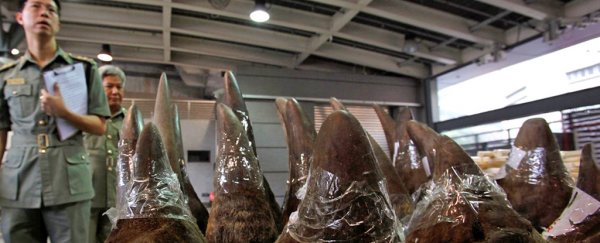China has halted a directive that partially legalized the domestic trade in farmed rhinoceros and tiger parts, two weeks after the move drew a torrent of criticism from conservation groups.
A senior official in China's cabinet said in a state media interview published Monday that implementation of an October directive reviving the market for the endangered animal parts has been "postponed after study".
The official, Ding Xuedong, did not specify how long the delay would last. But the interview, which was published in English and Chinese by the official Xinhua News Agency, was cheered by international conservation advocates who saw it as an acknowledgement by Chinese leaders that they made a misstep.
"The Chinese government has long been dedicated to the cause of wildlife protection and has made achievements recognized by the world," Xinhua quoted Ding, a top official in China's State Council, as saying.
China, Ding added, "has not changed its stance on wildlife protection and will not ease the crackdown on illegal trafficking and trade of rhinos, tigers and their byproducts."
The State Council unveiled a directive in late October ending a 25-year ban on trade for rhino and tiger parts - as long as they were sourced from farmed animals and used for traditional Chinese medicine.
The announcement sparked an outcry from wildlife advocates, as well as the United Nations, which warned that a resumption of China's market for tiger and rhino parts - no matter how narrowly proscribed - would fuel illegal poaching and devastate wild populations.
Conservation groups applauded China's latest reversal, saying it was more consistent with the position that Beijing has carved out in recent years as a leader on wildlife protection, environment and climate change.
China was praised last year for banning the elephant ivory trade altogether.
"It's a positive sign that China has heard and responded to the overwhelming concerns from the international community," said Leigh Henry, director of wildlife policy at the World Wildlife Fund.
"It's critical now that the ban remains permanent and is expanded to cover trade in all tiger parts and products, and that a commitment is made to phase out China's tiger farms altogether."
Wildlife advocates speculated in October that China's move to revive the animal parts market was driven by domestic politics.
Some viewed it as a way to promote traditional Chinese medicine, while others saw the measure as the handiwork of China's tiger farms, which have raised an estimated 6,000 tigers in captivity and seek a market for their goods.
Ding, the senior Chinese official, said this week the government would maintain its policy of "three strict bans", including a prohibition on the use of tiger and rhino parts for medicine, and appeared to extend an olive branch overseas.
"I would like to reiterate that the Chinese government is willing to work with the international community to jointly strive for protecting wildlife and building our harmonious and beautiful planet," he said.
2018 © The Washington Post
This article was originally published by The Washington Post.
